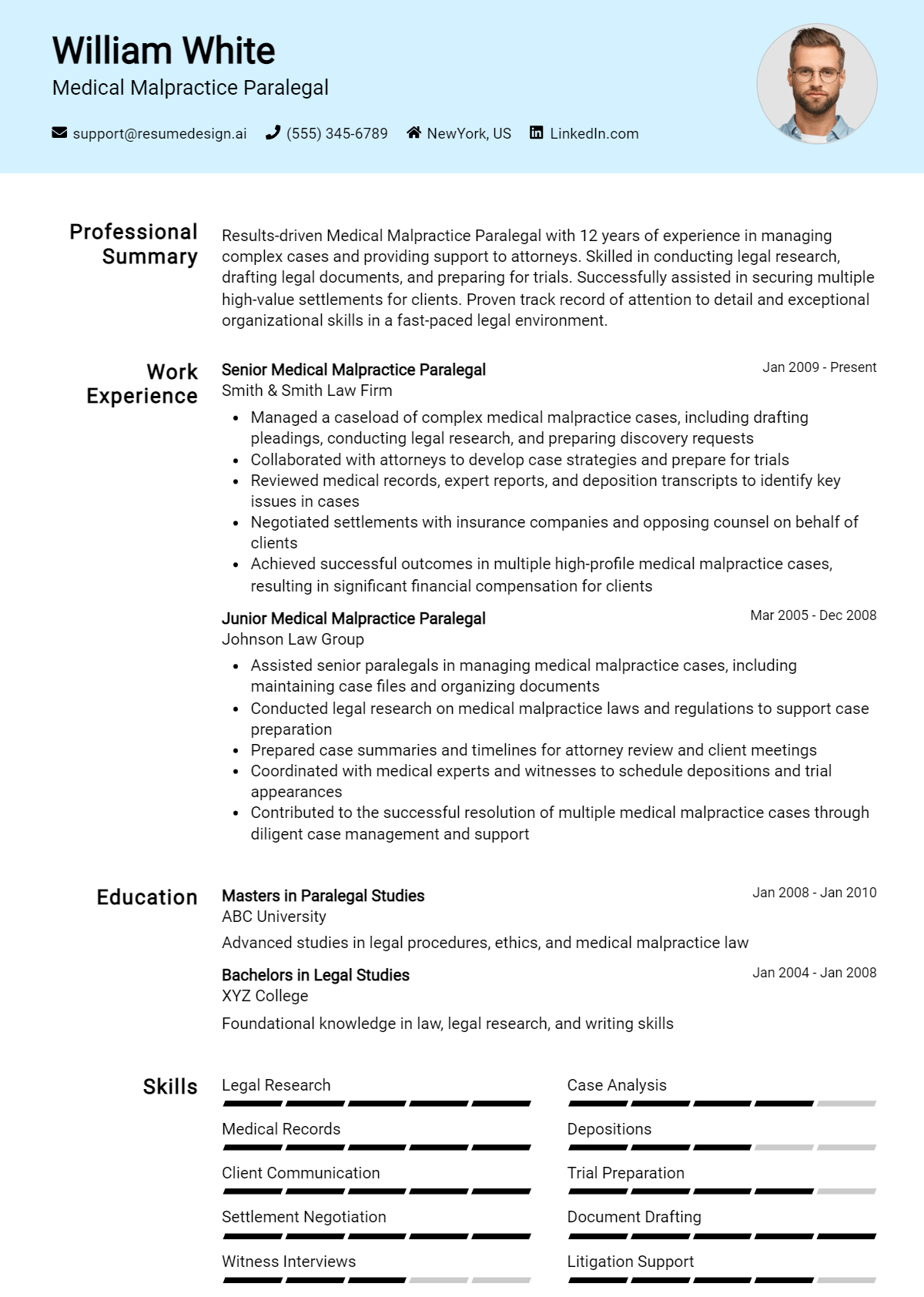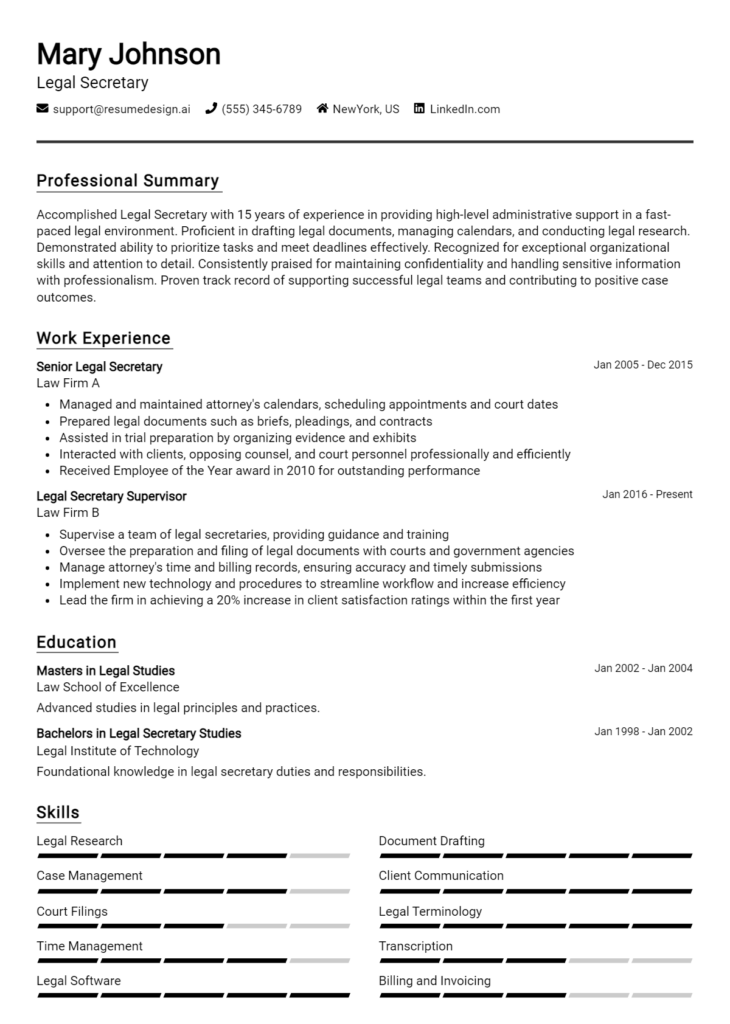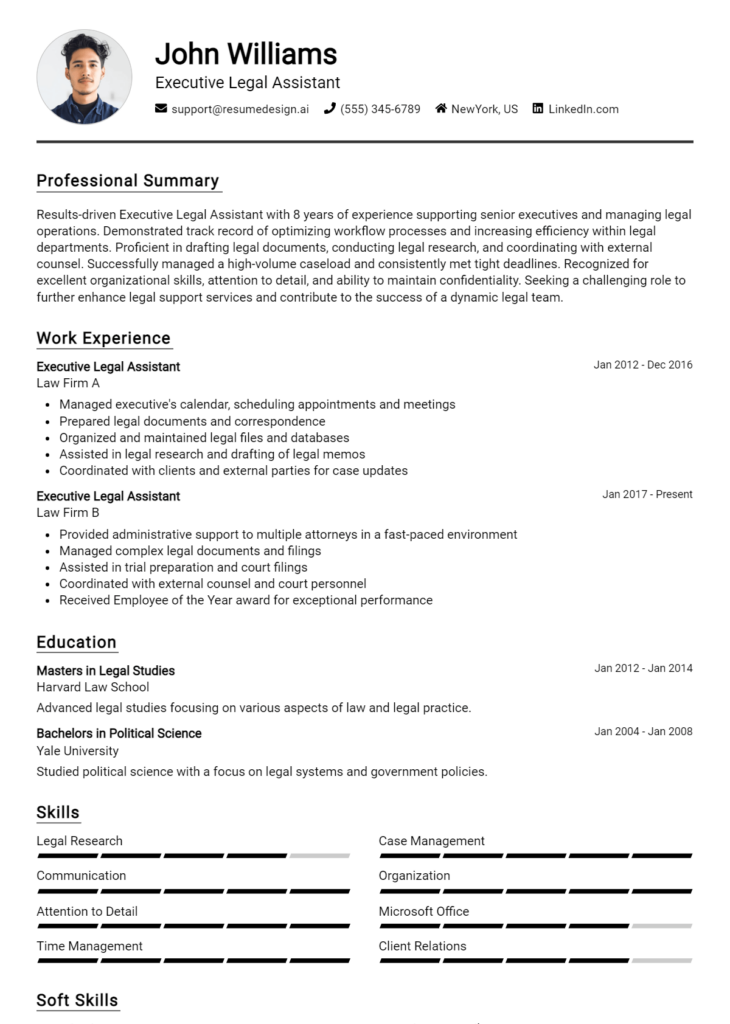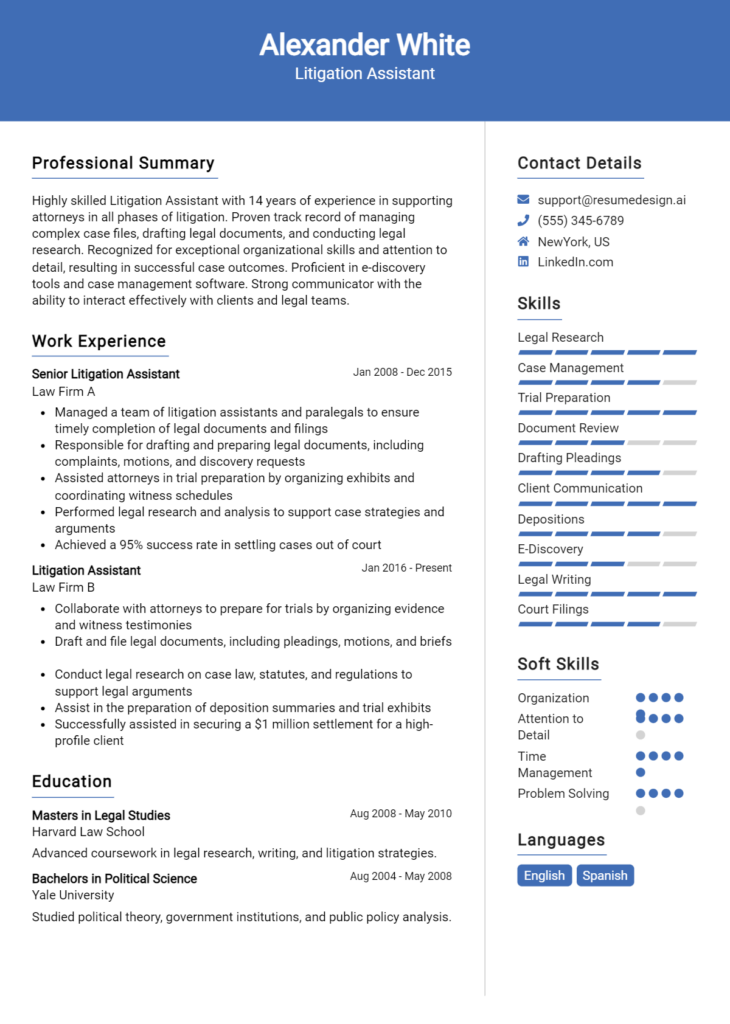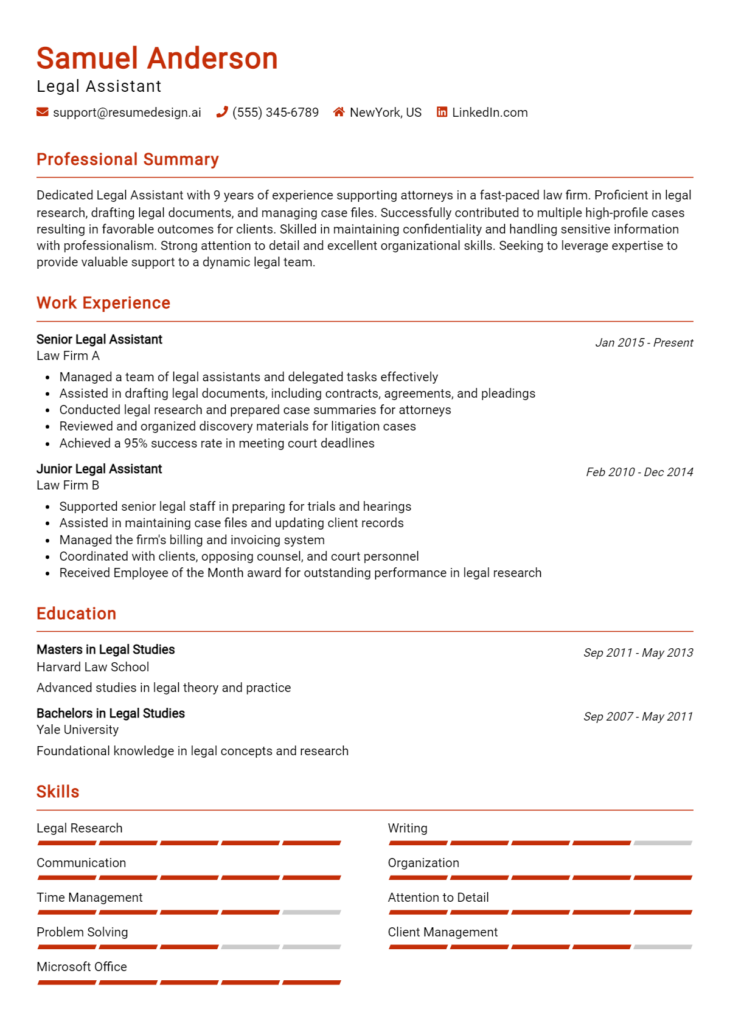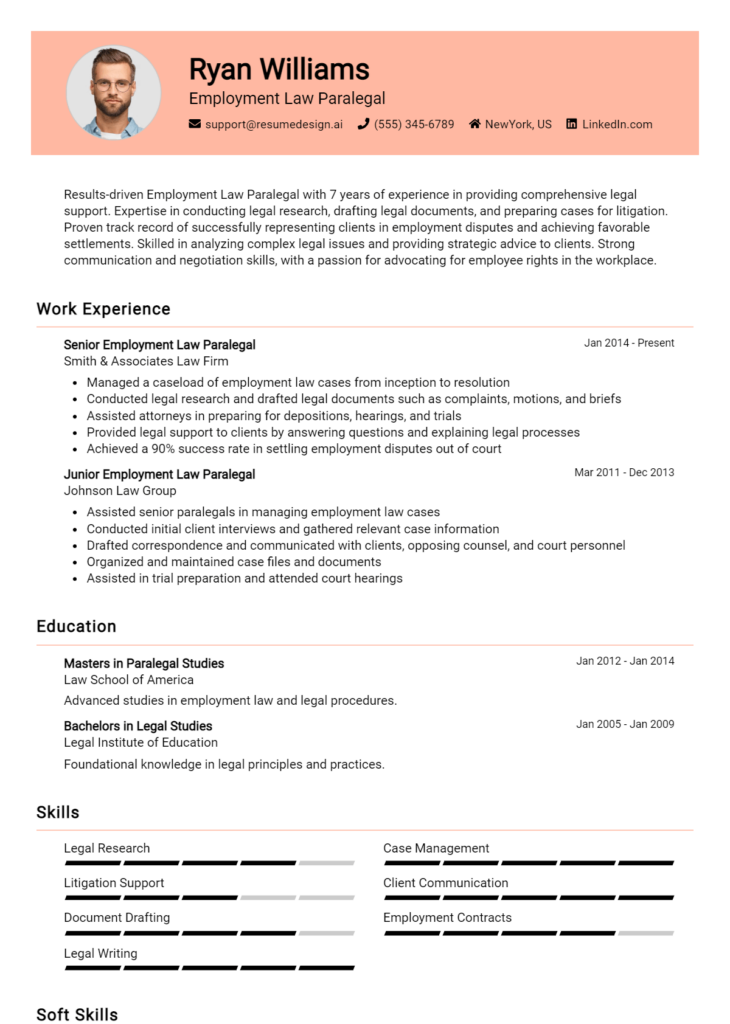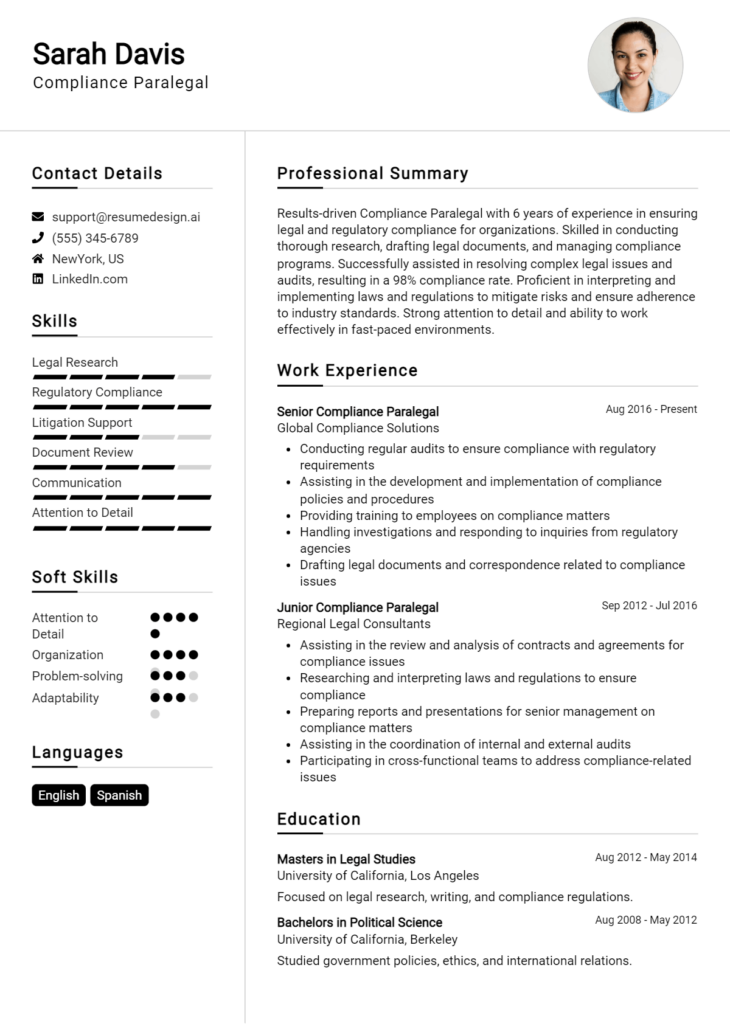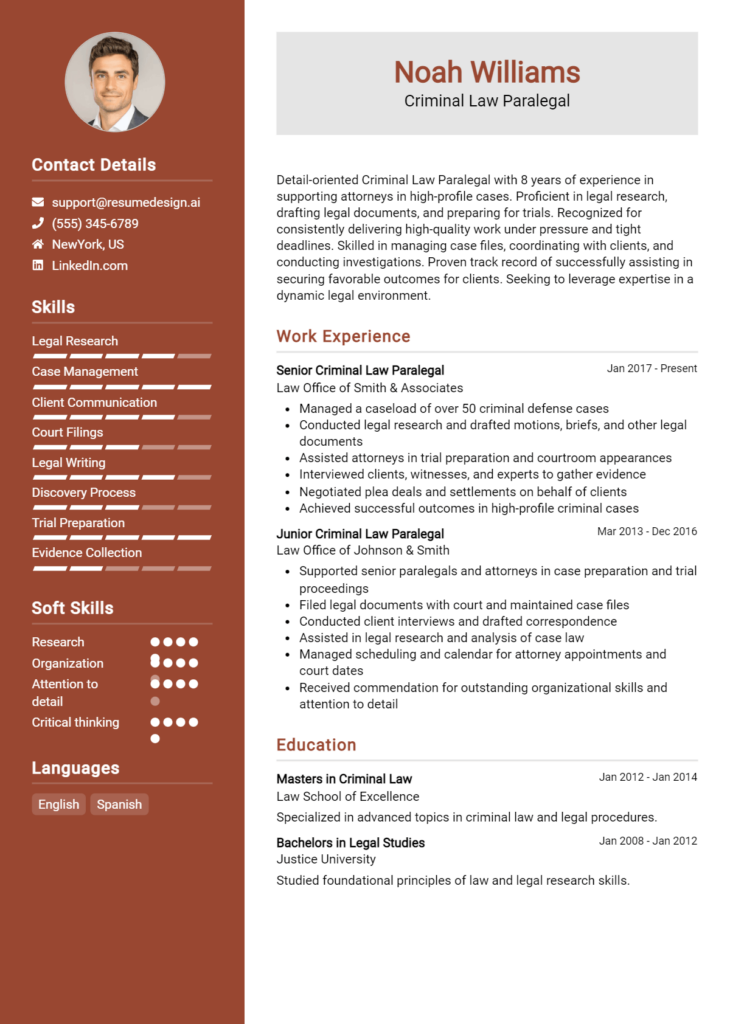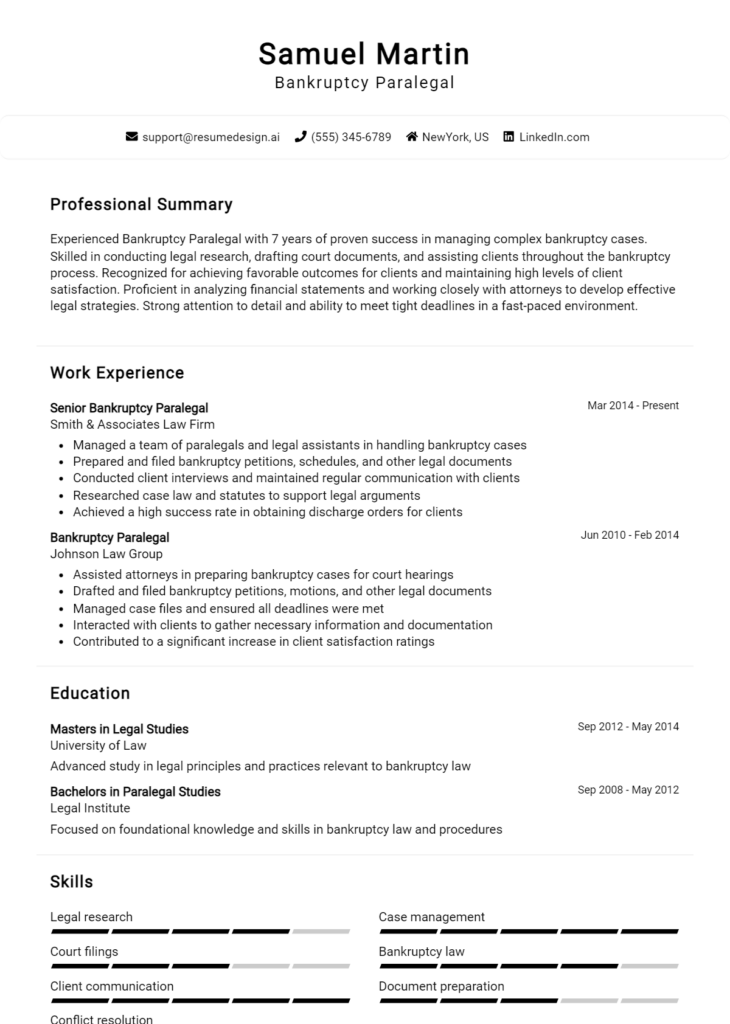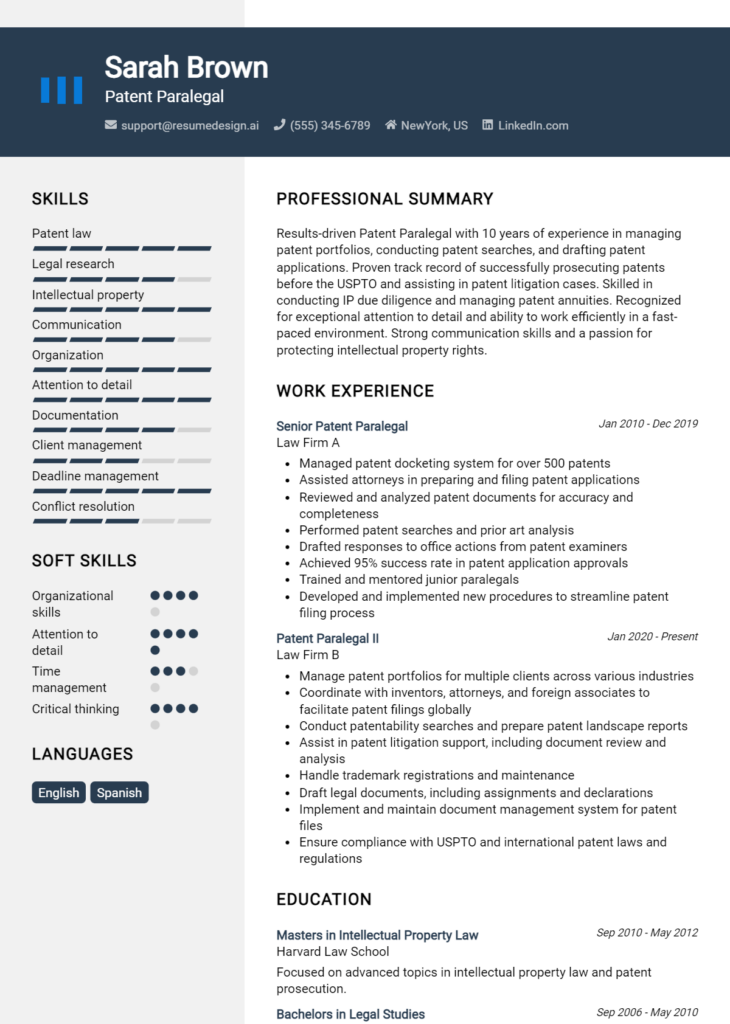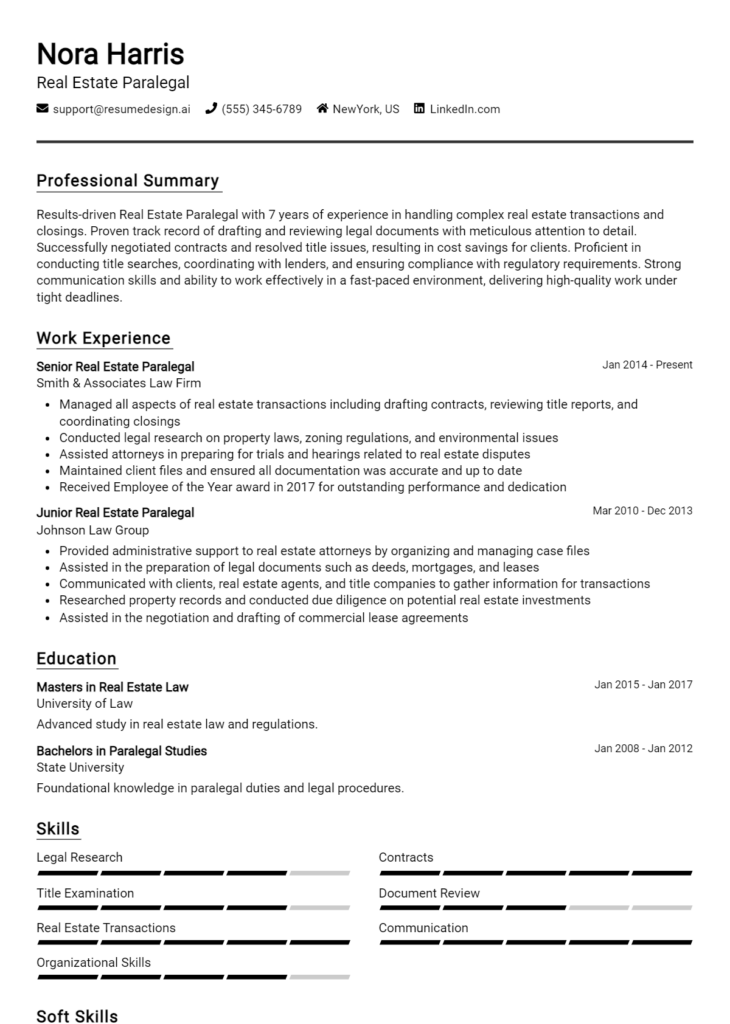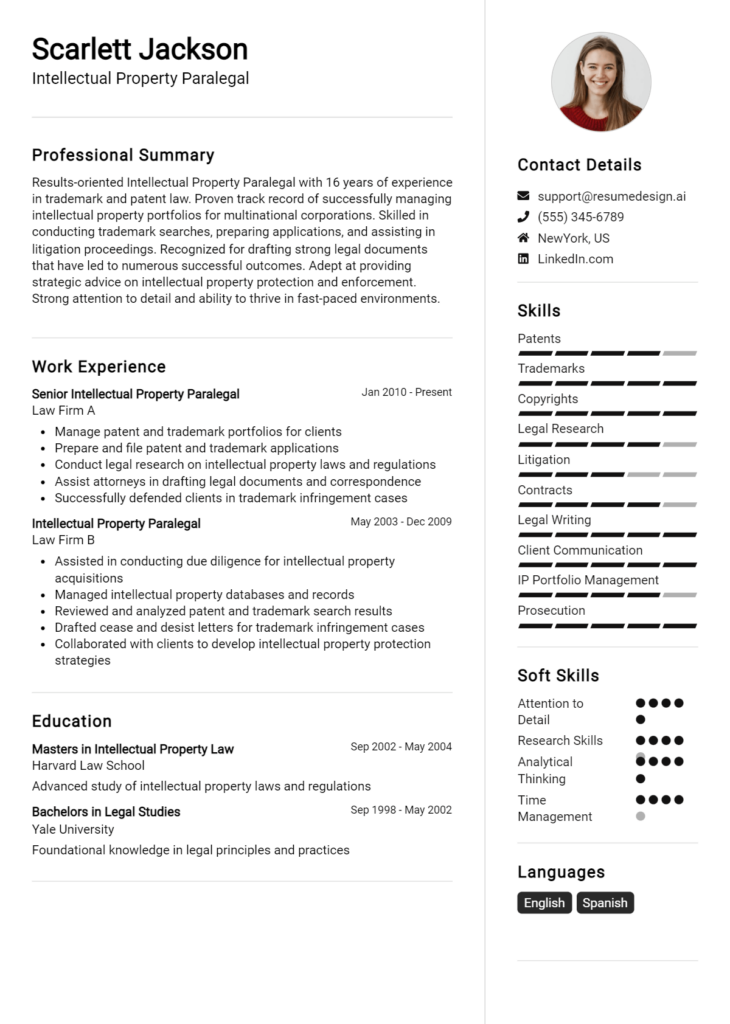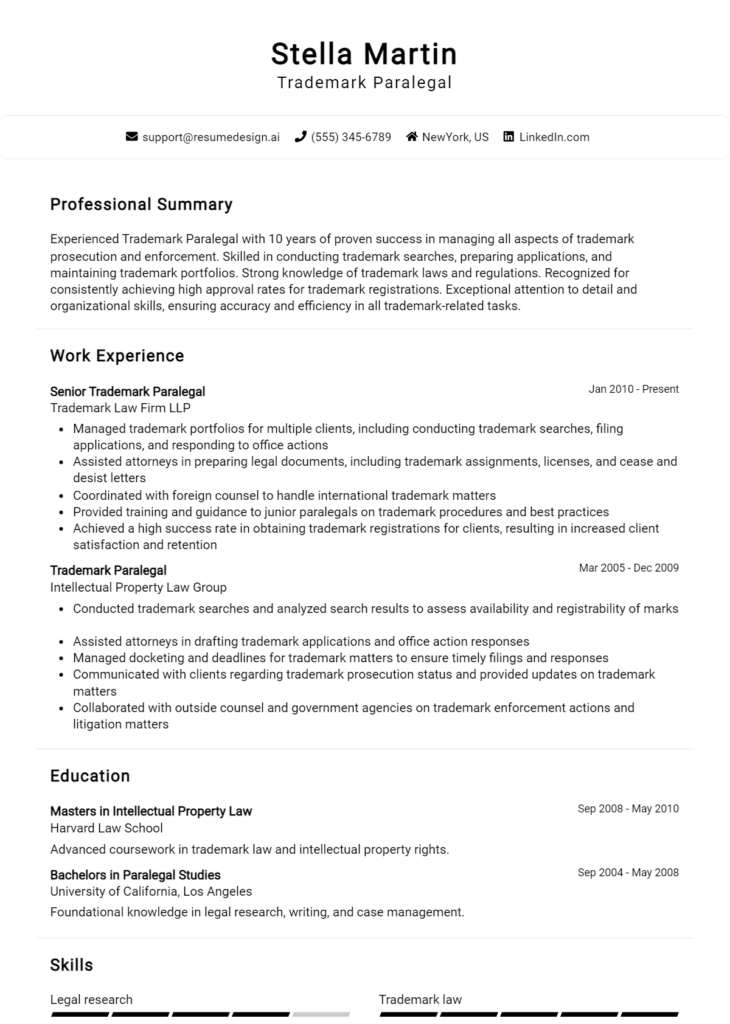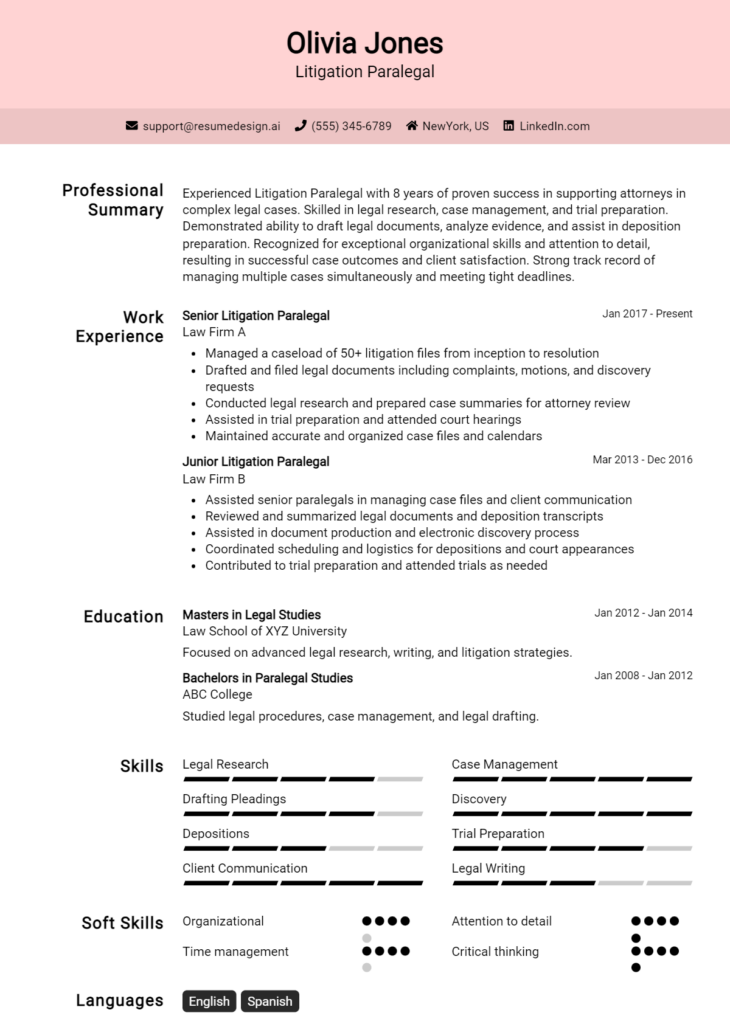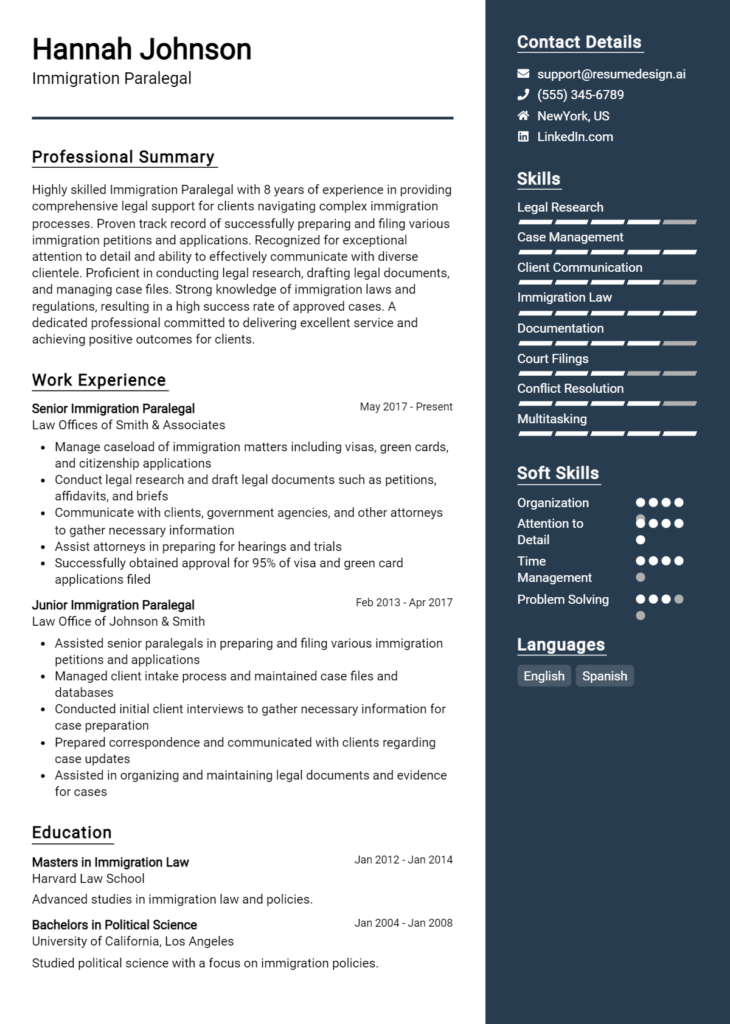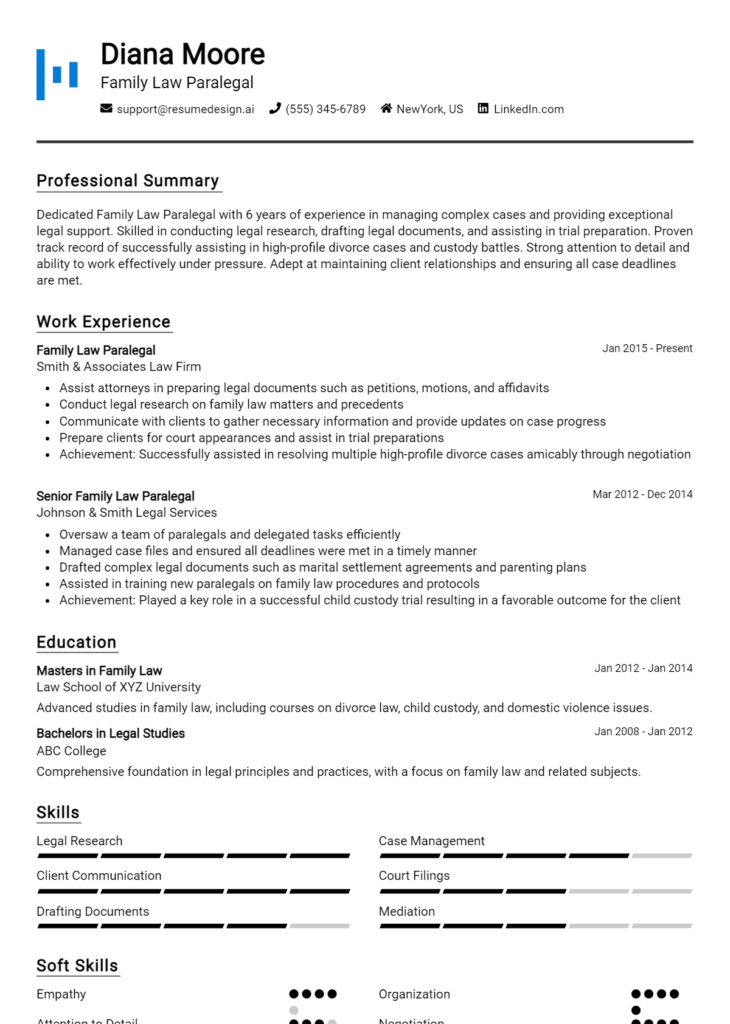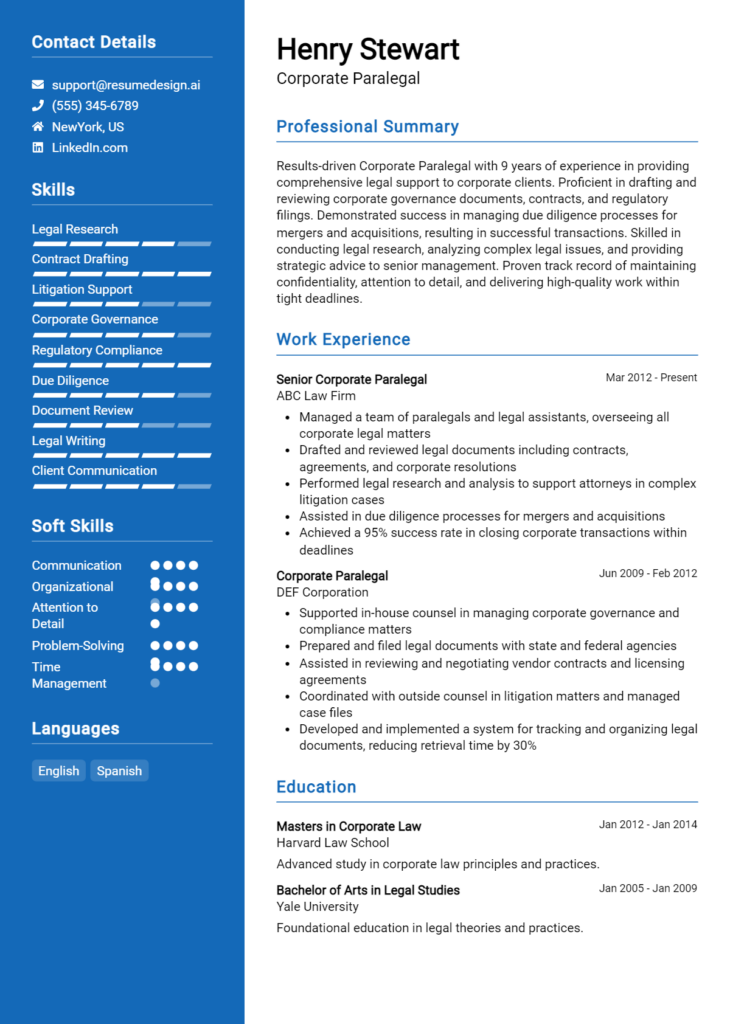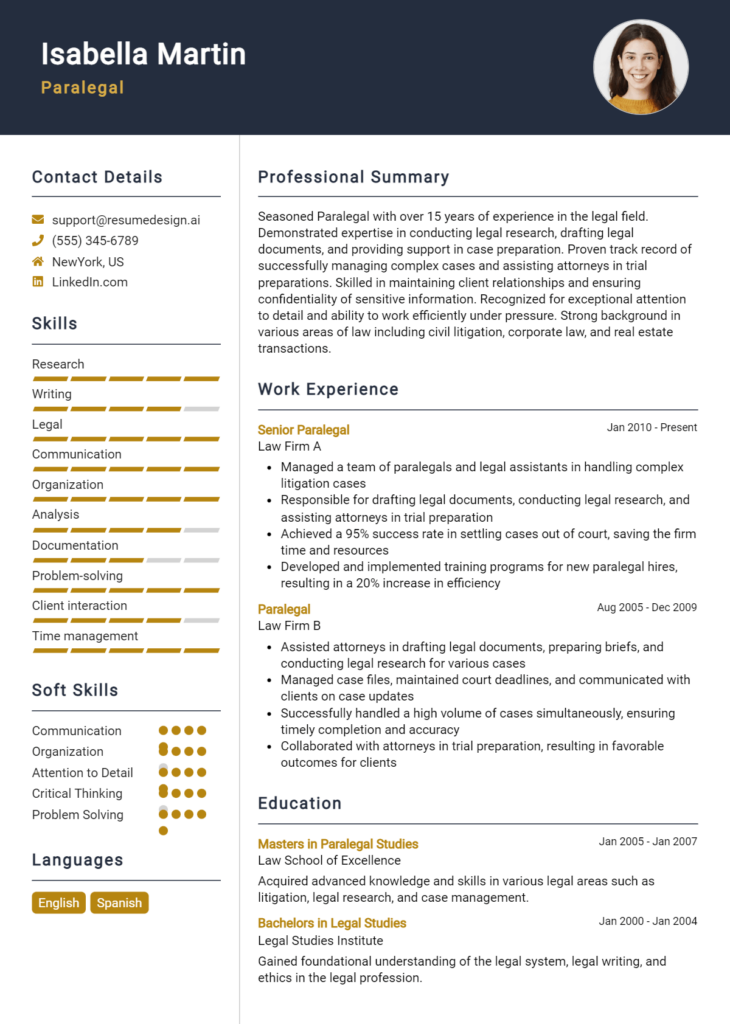Medical Malpractice Paralegal Core Responsibilities
A Medical Malpractice Paralegal plays a crucial role in bridging legal and medical departments, ensuring efficient communication and collaboration. Key responsibilities include conducting thorough legal research, organizing case files, and assisting attorneys in preparing for trials. Essential skills encompass technical proficiency in legal software, operational expertise in managing deadlines, and strong problem-solving abilities to navigate complex cases. These skills are vital for achieving organizational goals, and a well-structured resume can effectively highlight such qualifications, showcasing the candidate’s readiness for the role.
Common Responsibilities Listed on Medical Malpractice Paralegal Resume
- Conducting legal research on medical malpractice laws and precedents.
- Drafting legal documents, including complaints, motions, and discovery requests.
- Organizing and maintaining case files and evidence.
- Coordinating with medical experts and witnesses for testimony.
- Assisting attorneys in trial preparation and strategy development.
- Reviewing medical records and summarizing findings for case management.
- Managing case calendars, deadlines, and filing requirements.
- Communicating with clients to gather information and provide updates.
- Preparing trial exhibits and witness lists.
- Conducting interviews with clients and witnesses to gather relevant information.
- Monitoring changes in medical malpractice laws and regulations.
- Assisting in settlement negotiations and case assessments.
High-Level Resume Tips for Medical Malpractice Paralegal Professionals
In the competitive field of medical malpractice law, a well-crafted resume is not just a formality; it’s a critical tool that can significantly impact your job search. As the first impression a potential employer receives, your resume must effectively convey your skills, achievements, and understanding of the legal landscape. A strong resume not only highlights your qualifications but also tells a compelling story about your professional journey. This guide will provide practical and actionable tips specifically tailored for Medical Malpractice Paralegal professionals, ensuring your resume stands out in a crowded applicant pool.
Top Resume Tips for Medical Malpractice Paralegal Professionals
- Tailor your resume for each job application by incorporating keywords from the job description to align your skills with the employer's needs.
- Highlight relevant experience in medical malpractice law, including specific cases or projects you've worked on, to demonstrate your expertise.
- Quantify your achievements wherever possible, such as detailing the number of cases managed or the percentage of successful outcomes in settlements.
- Include industry-specific skills such as familiarity with medical terminology, legal research abilities, and knowledge of malpractice regulations.
- Showcase your proficiency with legal software and tools commonly used in the field, such as case management systems and document management software.
- Utilize a clean and professional format that enhances readability, ensuring your most important information stands out.
- Incorporate a summary statement that encapsulates your career highlights, emphasizing your passion for medical malpractice law.
- List relevant certifications and continuing education courses that demonstrate your commitment to professional development in the field.
- Include strong action verbs in your job descriptions to convey your contributions effectively, such as “analyzed,” “coordinated,” and “drafted.”
- Proofread meticulously to ensure there are no typos or grammatical errors, as attention to detail is crucial in the legal profession.
By implementing these resume tips, you can significantly enhance your chances of landing a job in the Medical Malpractice Paralegal field. A well-structured and targeted resume not only showcases your qualifications but also reflects your dedication to the profession, making you a more attractive candidate to potential employers.
Why Resume Headlines & Titles are Important for Medical Malpractice Paralegal
In the competitive field of legal support, particularly within medical malpractice, the role of a paralegal is both critical and multifaceted. A well-crafted resume headline or title acts as the first impression for hiring managers, encapsulating a candidate’s key qualifications in a succinct and impactful phrase. A strong headline can immediately grab attention, offering a quick summary of relevant skills and experiences that align with the job requirements. It serves not only to attract interest but also to set the tone for the rest of the resume, making it essential for candidates to ensure their headlines are concise, relevant, and directly related to the medical malpractice paralegal role they are pursuing.
Best Practices for Crafting Resume Headlines for Medical Malpractice Paralegal
- Keep it concise: Aim for a headline that is no longer than one or two lines.
- Be specific: Tailor the headline to reflect the job you are applying for, including relevant keywords.
- Highlight key qualifications: Mention your most notable skills or experiences that align with medical malpractice.
- Use action words: Start with dynamic verbs or strong adjectives to convey a sense of competence.
- Include years of experience: If applicable, highlight your experience level to establish credibility.
- Avoid jargon: Use clear language that is easily understood to ensure broad appeal.
- Make it unique: Differentiate yourself by focusing on what sets you apart from other candidates.
- Align with the job description: Reflect the language and requirements stated in the job posting.
Example Resume Headlines for Medical Malpractice Paralegal
Strong Resume Headlines
"Detail-Oriented Medical Malpractice Paralegal with 5+ Years of Experience in Litigation Support"
“Proficient Legal Researcher Specializing in Medical Malpractice Cases and Regulatory Compliance”
“Results-Driven Paralegal with Proven Track Record in Medical Malpractice Case Management”
Weak Resume Headlines
“Paralegal Looking for Job”
“Experienced Professional”
Strong resume headlines are effective because they immediately convey specific qualifications and relevant experience, making it easy for hiring managers to see the candidate's fit for the role. They utilize impactful language and focus on key strengths that resonate with the position. In contrast, weak headlines fail to impress because they lack specificity and clarity, leaving hiring managers with vague impressions rather than a clear understanding of the candidate's qualifications. Generic phrases do not highlight the candidate’s unique skills or experiences, which diminishes their chances of standing out in a competitive job market.
Writing an Exceptional Medical Malpractice Paralegal Resume Summary
A well-crafted resume summary is crucial for a Medical Malpractice Paralegal, as it serves as the first impression for hiring managers. An impactful summary succinctly captures the candidate's key skills, relevant experience, and noteworthy accomplishments, making it easier for employers to quickly gauge the applicant's fit for the role. Given the competitive nature of the legal field, a strong summary must be concise yet powerful, tailored specifically to the position being applied for, and designed to highlight the unique qualifications that set the candidate apart from other applicants.
Best Practices for Writing a Medical Malpractice Paralegal Resume Summary
- Quantify achievements where possible to demonstrate impact.
- Focus on key skills that are relevant to medical malpractice cases.
- Tailor the summary to align with the job description and requirements.
- Use strong action verbs to convey confidence and proactivity.
- Highlight specific areas of expertise, such as litigation support or legal research.
- Keep the summary concise—ideally within 3-5 sentences.
- Avoid jargon and overly complex language; aim for clarity.
- Include certifications or specialized training relevant to the role.
Example Medical Malpractice Paralegal Resume Summaries
Strong Resume Summaries
Detail-oriented Medical Malpractice Paralegal with over 5 years of experience in managing complex cases, resulting in a 95% success rate in settlements. Expert in drafting legal documents and conducting thorough research, contributing to an expedited case resolution process.
Dedicated Paralegal specializing in medical malpractice law, skilled in trial preparation and discovery procedures. Successfully assisted in a landmark case that resulted in a $2 million settlement, showcasing exceptional negotiation and communication skills.
Proficient Medical Malpractice Paralegal with a proven track record of supporting attorneys in high-stakes litigation. Managed a caseload of over 30 active cases, enhancing team efficiency by 20% through streamlined processes and meticulous documentation.
Weak Resume Summaries
Experienced paralegal with some knowledge of medical malpractice. Good at assisting lawyers with various tasks.
Paralegal with a background in law and a general understanding of medical cases. Looking to further my career.
The strong resume summaries effectively demonstrate the candidates' quantifiable achievements, specific skills, and direct relevance to the role, showcasing their value to potential employers. In contrast, the weak summaries lack detail, fail to provide any measurable outcomes, and come across as generic, making it difficult for hiring managers to assess the candidates' qualifications and suitability for a Medical Malpractice Paralegal position.
Work Experience Section for Medical Malpractice Paralegal Resume
The work experience section of a Medical Malpractice Paralegal resume is critical for demonstrating the candidate's technical skills, ability to manage teams, and commitment to delivering high-quality results. This section serves as a showcase for relevant experiences that align with industry standards, highlighting not only the tasks performed but also the outcomes achieved. Candidates should focus on quantifying their achievements, emphasizing how their contributions led to improved processes, successful case outcomes, or enhanced team performance. By presenting well-defined experiences, candidates can effectively illustrate their qualifications and readiness for the role.
Best Practices for Medical Malpractice Paralegal Work Experience
- Use action verbs to start each bullet point to convey a sense of proactivity.
- Quantify achievements whenever possible, such as the number of cases handled or settlement amounts secured.
- Highlight specific technical skills relevant to medical malpractice law, such as legal research, document management, and case analysis.
- Showcase collaborative efforts with attorneys, medical professionals, and other paralegals to demonstrate teamwork.
- Include any leadership roles taken on during projects or within teams to emphasize management capabilities.
- Align experiences with industry standards by incorporating legal terminology and processes familiar to the medical malpractice field.
- Be concise and focused; use bullet points to improve readability and impact.
- Tailor experiences to the job description to ensure relevance to the position being applied for.
Example Work Experiences for Medical Malpractice Paralegal
Strong Experiences
- Successfully managed a caseload of over 50 medical malpractice cases, leading to a 30% increase in favorable settlements within one year.
- Conducted comprehensive legal research and prepared over 100 detailed case briefs, which contributed to winning 85% of trials.
- Collaborated with a team of 5 attorneys to develop litigation strategies that resulted in a $2 million settlement for a high-profile case.
- Implemented a new document management system that improved retrieval times by 40%, enhancing overall team efficiency.
Weak Experiences
- Assisted attorneys with various tasks and paperwork as needed.
- Helped in organizing files and documents for cases.
- Participated in team meetings to discuss case progress.
- Worked on legal documents related to cases in a general capacity.
The examples labeled as strong are characterized by specific, quantifiable outcomes and demonstrate clear technical expertise and collaboration. They provide measurable results and concrete contributions to the success of legal cases, showcasing the candidate’s value. In contrast, the weak experiences are vague and lack detail, failing to convey the candidate's impact or specialization in medical malpractice law, which diminishes their overall effectiveness on a resume.
Education and Certifications Section for Medical Malpractice Paralegal Resume
The education and certifications section of a Medical Malpractice Paralegal resume is crucial in establishing the candidate's qualifications and expertise in the field. This section provides a snapshot of the candidate's academic background, showcasing degrees and relevant coursework that lay the foundation for their legal knowledge. Additionally, industry-relevant certifications demonstrate a commitment to professional development and proficiency in medical malpractice law. By including specialized training and continuous learning efforts, candidates can significantly enhance their credibility and align themselves with the specific demands of the job role, making them more appealing to potential employers.
Best Practices for Medical Malpractice Paralegal Education and Certifications
- List degrees in relevant fields, such as Paralegal Studies, Legal Studies, or Health Law.
- Include industry-recognized certifications, such as the National Association of Legal Assistants (NALA) certification.
- Highlight any specialized training or workshops related to medical malpractice or litigation.
- Provide relevant coursework that directly pertains to medical malpractice, personal injury, or healthcare law.
- Ensure that all listed credentials are up-to-date and reflect current industry standards.
- Use clear and concise language to describe educational achievements and certifications.
- Prioritize certifications and coursework that demonstrate advanced knowledge or skills relevant to the role.
- Format the section consistently to enhance readability and professionalism.
Example Education and Certifications for Medical Malpractice Paralegal
Strong Examples
- Bachelor of Science in Paralegal Studies, University of XYZ
- Certified Paralegal (CP), National Association of Legal Assistants (NALA)
- Certificate in Health Law, ABC University
- Coursework in Medical Malpractice Litigation and Personal Injury Law, XYZ Community College
Weak Examples
- Associate Degree in General Studies, Unnamed Community College
- Certification in Administrative Assistance, Outdated Certification Body
- Coursework in Basic Computer Skills, Generic Online Course
- High School Diploma, Generic High School
The examples listed as strong represent relevant educational qualifications and certifications that directly align with the demands of a Medical Malpractice Paralegal. They showcase specialized knowledge and skills that enhance the candidate's suitability for the role. Conversely, the weak examples illustrate a lack of relevance to the medical malpractice field, outdated certifications, or basic skills that do not contribute to the professional requirements of a paralegal, thereby diminishing the candidate's credibility and appeal in a competitive job market.
Top Skills & Keywords for Medical Malpractice Paralegal Resume
The role of a Medical Malpractice Paralegal is critical in supporting attorneys who handle complex cases involving medical errors and negligence. A well-crafted resume that highlights specific skills can set a candidate apart in this competitive field. Employers look for both hard and soft skills that demonstrate a paralegal’s ability to navigate the intricacies of medical law, manage documentation efficiently, and communicate effectively with clients and medical professionals. By showcasing these skills, a Medical Malpractice Paralegal can not only illustrate their qualifications but also their readiness to contribute to a legal team dedicated to advocating for victims of medical malpractice.
Top Hard & Soft Skills for Medical Malpractice Paralegal
Hard Skills
- Proficient in legal research techniques
- Knowledge of medical terminology and healthcare regulations
- Familiarity with case management software
- Ability to draft legal documents and pleadings
- Understanding of litigation processes and procedures
- Experience with e-discovery tools
- Proficient in Microsoft Office Suite (Word, Excel, PowerPoint)
- Ability to manage and organize case files
- Knowledge of evidence gathering and preservation
- Familiarity with state and federal court rules
- Proficient in conducting interviews with medical experts
- Ability to analyze and summarize medical records
- Knowledge of trial preparation and support
- Familiarity with billing procedures and timekeeping
- Strong data entry skills
- Experience with client management systems
- Ability to prepare and file documents electronically
- Understanding of insurance policies and claims processes
Soft Skills
- Strong communication skills, both written and verbal
- Excellent organizational and time management abilities
- Attention to detail and accuracy
- Critical thinking and problem-solving skills
- Ability to work under pressure and meet deadlines
- Strong interpersonal skills for client interaction
- Ability to work collaboratively with legal teams
- Adaptability and willingness to learn
- Empathy and understanding towards clients
- Strong ethical standards and professionalism
- Initiative and self-motivation
- Ability to manage multiple tasks and priorities
- Conflict resolution skills
- Active listening skills
- Strong research and analytical skills
- Ability to maintain confidentiality and handle sensitive information
- Openness to constructive feedback and a desire for continuous improvement
By incorporating both hard and soft skills into a resume, candidates can effectively demonstrate their qualifications for the role of Medical Malpractice Paralegal. For more guidance on how to highlight these skills and showcase relevant work experience, prospective applicants can refer to additional resources that offer valuable insights.
Stand Out with a Winning Medical Malpractice Paralegal Cover Letter
I am writing to express my interest in the Medical Malpractice Paralegal position at [Company Name] as advertised on [Job Posting Source]. With over [X years] of experience in the legal field, specializing in medical malpractice cases, I have developed a comprehensive understanding of the legal processes involved, as well as the ability to handle complex litigation effectively. My strong organizational skills, attention to detail, and commitment to delivering high-quality support make me a strong candidate for this role.
In my previous position at [Previous Company Name], I was responsible for managing a diverse caseload that included gathering and analyzing medical records, drafting legal documents, and conducting thorough research to support our attorneys. My ability to communicate effectively with clients, medical professionals, and court personnel ensured that all parties were kept informed and that deadlines were consistently met. I also played a pivotal role in preparing for depositions and trial proceedings, which involved coordinating expert witness testimony and compiling evidence to bolster our case.
I am particularly drawn to this opportunity at [Company Name] because of your firm’s commitment to advocating for patients and ensuring justice in medical malpractice cases. I share this passion and am eager to contribute my skills in legal research, document preparation, and case management to support your team. I am confident that my proactive approach and dedication to client service will add value to your practice and help achieve successful outcomes for your clients.
Thank you for considering my application. I look forward to the opportunity to discuss how my experience and skills align with the needs of your firm. I am excited about the possibility of contributing to [Company Name] and helping to advance the important work you are doing in the field of medical malpractice law.
Common Mistakes to Avoid in a Medical Malpractice Paralegal Resume
When crafting a resume for a Medical Malpractice Paralegal position, it's essential to present a polished and professional image that accurately reflects your skills and experiences. However, many candidates make common mistakes that can undermine their chances of landing an interview. Avoiding these pitfalls can significantly enhance your resume’s effectiveness and help you stand out in a competitive job market.
Generic Objective Statement: Using a one-size-fits-all objective can make your resume seem impersonal. Tailor your objective to reflect your specific interest in medical malpractice law and how you can contribute to the firm.
Lack of Relevant Experience: Failing to highlight experience specific to medical malpractice can be detrimental. Ensure that you clearly outline any roles or responsibilities that relate directly to this area of law.
Omitting Key Skills: Neglecting to include essential skills, such as legal research, case management, and familiarity with medical terminology, can weaken your resume. Be sure to list skills that are directly applicable to the medical malpractice field.
Poor Formatting: A cluttered or overly complex layout can distract from your qualifications. Use clear headings, bullet points, and consistent formatting to enhance readability.
Ignoring Keywords: Not incorporating keywords from the job description can lead to your resume being overlooked by applicant tracking systems (ATS). Pay attention to specific terms and phrases that are commonly used in medical malpractice job postings.
Inaccurate or Incomplete Information: Providing incorrect dates of employment or leaving out relevant certifications can create doubts about your attention to detail. Always double-check your information for accuracy and completeness.
Too Much Focus on Duties Rather than Achievements: Simply listing job duties without detailing your achievements can make your contributions seem less impactful. Use quantifiable results to showcase how you added value in previous positions.
Neglecting Professional Development: Failing to mention ongoing education or certifications can make your resume seem stagnant. Highlight any continuing legal education (CLE) courses or relevant workshops you've completed to demonstrate your commitment to the field.
Conclusion
As a Medical Malpractice Paralegal, your role is crucial in supporting attorneys with complex legal matters related to medical negligence. Throughout this article, we've explored the essential skills required for this position, including strong research capabilities, attention to detail, and a deep understanding of medical terminology and legal procedures. We've also discussed the importance of effective communication and organizational skills in managing case files and interacting with clients and medical professionals.
To excel in this competitive field, having a polished and professional resume is vital. Your resume should highlight your relevant experience, education, and specific skills that align with the responsibilities of a Medical Malpractice Paralegal. It's essential to tailor your resume to showcase your strengths and make a lasting impression on potential employers.
Now is the perfect time to review and enhance your Medical Malpractice Paralegal resume. Consider utilizing available resources to boost your application. Explore resume templates to find a design that suits your style. Use the resume builder to create a polished and professional document effortlessly. Check out resume examples for inspiration on how to structure your experience and accomplishments. Lastly, don't forget to craft a compelling cover letter with the help of cover letter templates to further enhance your job application.
Take action now—review your resume and utilize these tools to improve your chances of landing your ideal position as a Medical Malpractice Paralegal!

